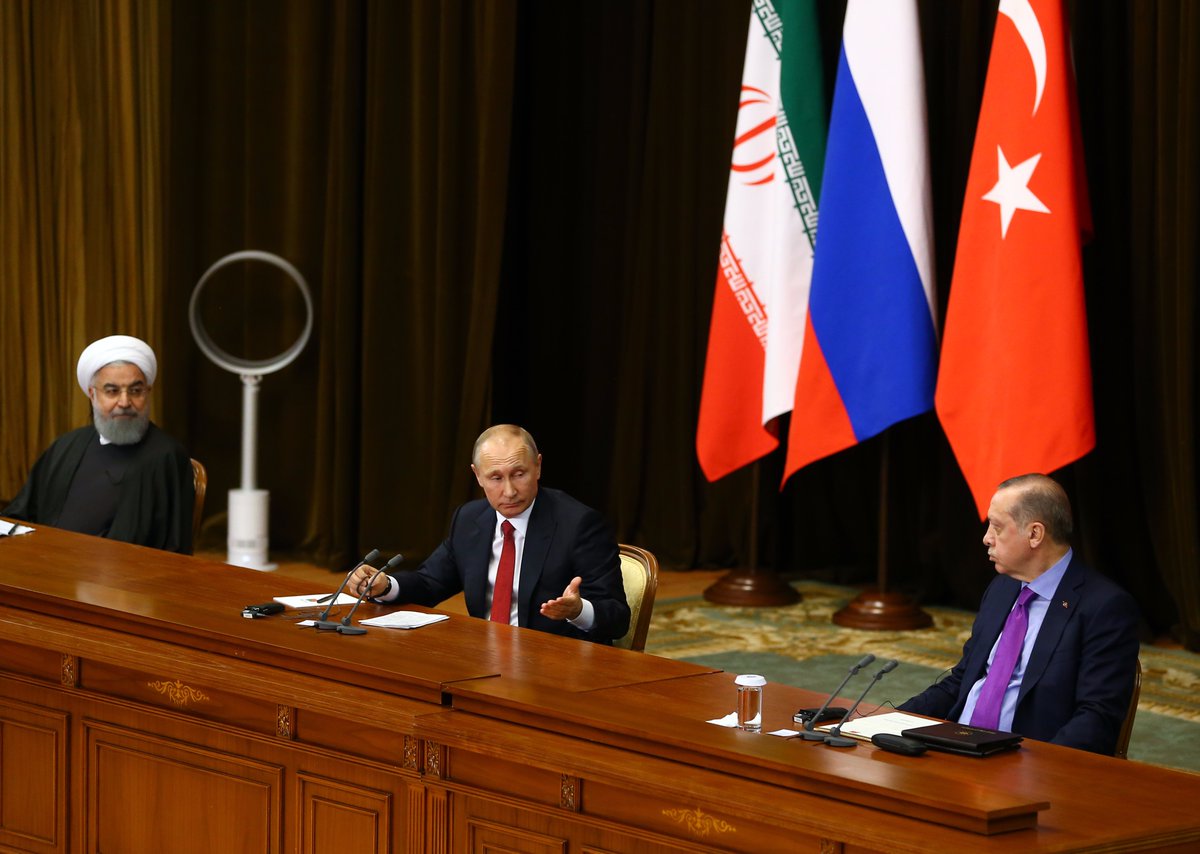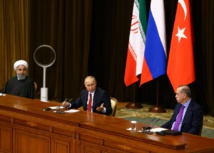They are initially having separate bilateral meetings, with the first under way between Erdogan and Rowhani.
The three regional powers are the guarantors of the Astana peace process launched in Kazakhstan in January 2017 to end Syria's war, meant to complement UN-led conflict resolution efforts.
Tuesday marks one year since Turkey and Russia agreed to create a demilitarized zone around Idlib - also including the neighbouring provinces of Latakia, Hama and Aleppo - to keep a Syrian offensive at bay.
But on April 30, Syrian forces, bolstered by Russian air power, started pounding Idlib and rebel areas in Hama.
In the four months since, the United Nations says 1,089 civilians have been killed and more than 400,000 displaced in and around the Idlib demilitarized zone.
Expectations are low for any lasting outcome from the summit, say analysts. Russia and Iran support Syrian President Bashar al-Assad. Ankara backs certain rebel groups, while also placating Moscow and cooperating with Washington, which supports Syrian Kurdish militias.
Erdogan's main concern is that the Syrian onslaught in Idlib - home to 3 million people and close to Turkey's border - will trigger a new refugee crisis.
Turkey already hosts 3.6 million Syrian refugees. Erdogan recently threatened to "open the gates" to Europe if Turkey "did not receive the necessary support from the world, particularly Europe" to shoulder the Syrian refugee burden.
He spoke to German Chancellor Angela Merkel last week about the EU-Turkey deal reached in 2016 to stem the flow of refugees to Europe.
"Erdogan has been trying to rally support from Europe and the United States. He wants them to pressure the Russians on his behalf, but I'm not sure how much effect that would have," said Aron Lund, a fellow at the Century Foundation think tank.
"Ankara is unlikely to persuade Moscow and Tehran to dissuade Damascus from taking over Idlib," said Diyar Autal, an associate at Harvard University's Davis Centre for Russian and Eurasian Studies.
"Putin is the key power broker in these talks," Autal told dpa. While seeking to keep al-Assad in power, Putin is also trying "to drive a wedge between Turkey and its key NATO ally, the US, and is thus prepared to heed Turkey's concerns to an extent," he said.
A lot of what happens next in Idlib also depends on the dominant Islamist militant group in the region - Hayat Tahrir al-Sham (HTS), an al-Qaeda affiliate.
HTS has, however, faced a loss of reputation among Idlib residents because it offered little significant resistance during the recent offensive.
"Idlib is the home of people who were displaced by al-Assad and his mercenaries. Today we feel we live under the same rule of tyrants," said an activist in Idlib who identified himself as Ahmed. There is a widespread feeling that HTS has betrayed the people of Idlib, he said.
While there has been speculation that Turkey is seriously discussing dissolving HTS, which is riven by internal divisions, Firas Modad, a director of country risk focused on the Middle East at IHS Markit, stressed that HTS retains significant power.
"Previous Turkish attempts to weaken it ended with the defeat of Turkey's allies," Modad said.
The three leaders will also revisit the contentious issue of a committee to write a new Syrian constitution, which the UN sees as the next step to finding a political solution to end the eight-year war.
"The willingness of Damascus to not only negotiate but to truly compromise with the opposition as part of the constitutional commission that is being discussed by the trio is highly doubtful," said Autal.
Modad dampened any expectations from the summit, saying none of the parties have changed their position: "No one has much room to manoeuvre."
-----------------------------------------------------------------------------------------------------------









 Home
Home Politics
Politics











